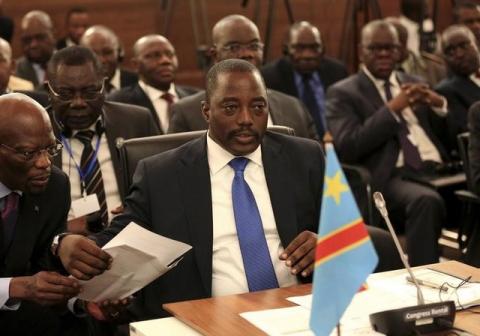Advertisement
Congo MPs want court ruling on Kabila's future if polls not held
KINSHASA (Reuters) - Supporters of Congo President Joseph Kabila want the country's highest court to rule on whether he would stay in power if his government fails to hold an election due in November, a senior ally said on Thursday.
Kabila, in power since 2001, is required by the constitution to step down when his second elected term ends later this year.
The government says logistical and budgetary problems could prevent it from holding the vote on time, while his opponents claim he is deliberately delaying the polls to extend his rule.
The uncertainty over the polls has sparked debate over what the constitution prescribes if a vote is not held on time.
"There is a request initiated by deputies from the Presidential Majority in the National Assembly that we plan to submit to the Constitutional Court," Ramazani Shadari, the deputy secretary-general of Kabila's party, told Reuters.
Kabila's allies say that Article 70 of the constitution, which states that the president "remains in office until the installation of the new elected president", means that Kabila would stay in power if the election is delayed.
Opponents counter that the Senate president should replace Kabila in that case, basing their argument on Article 75 of the constitution, which transfers the presidency to the head of the Senate if the office is vacant.
"We want to ask the Constitutional Court what (Article 70) means because there are other politicians from the opposition who argue the contrary," Shadari said, adding that the lawmakers planned to file their petition on Friday.
Congo has never experienced a peaceful transition of power. Dozens died in violent protests in January 2015 against a proposed revision of the election law that opponents said was a ploy to postpone elections.
Kabila has refused to state publicly whether he intends to stand for a third term, which would require a constitutional change. He has instead called for a national dialogue to address obstacles to holding elections.
An African Union-appointed facilitator, former Togolese Prime Minister Edem Kodjo, said on Monday he planned to name a preparatory committee for the dialogue by the end of the week.
Most major opposition parties refuse to participate, calling the dialogue a pretext to extend Kabila's time in power.
(Reporting by Aaron Ross and Amedee Mwarabu Kiboko; Editing by Joe Bavier and Tom Heneghan)



















Add new comment